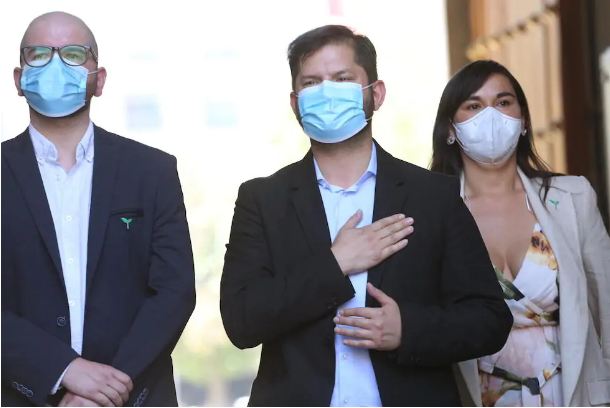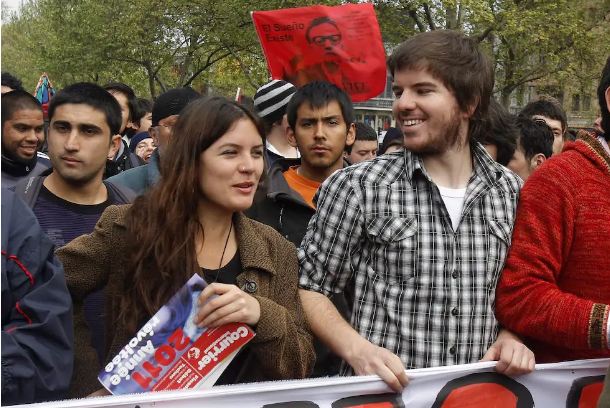[ad_1]
On Sunday, Chile elected the new president, 35-year-old Gabriel Boric, who in the election passed by a completely unexpected margin the other candidate, Jose Antonio Cast, of the extreme right and a nostalgic of former Chilean general and dictator Augusto Pinochet.
Boric, who will take office in March, will not only be the youngest president in Chilean history, but will also be the most progressive since the days of Salvador Allende, who died in the 1973 coup. , through which Pinochet came to power.
He will find a place profoundly changed by the big protests that started in 2019 for the increase of the price of the subway ticket in the capital, where they crossed the initial borders, turning into bigger and more ambitious protests.
A movement born of these protests had in fact brought about the decision to rewrite the 1980 Constitution, drafted during the dictatorship; this movement called into question the so-called “Chilean model”, based on a pronounced neoliberalism and which for many years was considered a success and an example to be followed by other Latin American countries.
This movement also brought a new leadership of the left, very young even in age, but formed by student protests, which had managed to put on the agenda of the Chilean political debate many issues neglected by previous governments; such as environmentalism, feminism and respect for human rights.
It was this new leadership that emerged from Boric, who will be the first Chilean president to belong to none of the traditional parties that have ruled the country since the return of democracy in 1990. The new president had around him many associates from different political experiences, but united for a single purpose: the radical change of the country has become as necessary as ever.
He won as leader of the electoral coalition Pacto Apruebo Dignidad, which is formed by two coalitions, both very important during the protests of recent years. The first coalition is Frente Amplio and is followed by Chile Digno and Verde y Soberano which includes the Communist Party.
Boric was elected as a presidential candidate by Frente Amplio in early 2021 for his political skills, but that “fate worked in his favor”, writes El Pais. In fact, Boric was 35 years old, the minimum age required by Chile to become president, while the other leading candidate, Giorgio Jackson, who would later become the political strategist of his election campaign, was 34 years old.

Gabriel Boric, Izkia Siches and Giorgio Jackson arrive at the Moneda Palace, the seat of the Chilean government in Santiago, on December 20, 2021
In addition to Jackson, there are other central figures who played a very large role in Boric’s political rise, who are part of the new leadership that emerged during the protests that began in 2019 and that were formed mainly politically in the university protests during the government of first of Pinera, in 2011.
One of the first names is Izkia Siches, a 35-year-old doctor, the only person who climbed the podium after the announcement of the election result. Siches, who was put in charge of the election campaign for the second round, was entrusted with the reversal of the election results in different areas of Chile, where she won. She managed to take advantage of her popularity that she created during the pandemic period, which ran the Colegio Medico association, and which advised the government to close the city of Santiago completely to avoid a rapid deterioration of the epidemiological situation.
It is not yet clear what role Siches may play in Boric’s new government, but it is not ruled out that she will be the next Minister of Health, the same post that Michelle Bachelet took before being elected President of Chile.
Other central figures in Boric’s inner district are two communist leaders, Camila Vallejo and Karol Cariola, a 33-year-old geographer and a 34-year-old nurse. There is also Miguel Crispi from the Revulucion Democratica party (one of the two parties that make up the Frente Amplio coalition), who is 36 years old and is the son of a socialist minister in the Bachelet government and also the Socialist MP Maya Fernandez, who is 50 years old and is Allende’s granddaughter.

Student leaders Giorgio Jackson and Camila Vallejo during a protest in Santiago on September 22, 2011
The profound changes taking place in Chile were expressed with the emergence of a new political leadership, but they could also turn into major and ambitious reforms, promised by Boric in the election campaign. The main objective of these reforms should be to at least partially dismantle the neoliberal model that has prevailed in Chile over the past decades.
Boric has proposed a tax increase for the so-called “super rich” and businesses to finance the social reforms the country needs. He also proposed the abolition of the current private health insurance system, accused of excluding the poorest sections of the population from health care and the creation of a Universal Health Fund, in order to finance health services in public and private centers.
Boric has stated that he will gradually reduce the number of working hours, to a maximum of 40 hours per week, increase the minimum wage and subsidize young people and women. He has promised to strengthen public schools and pay off debts for all schools, with the aim of creating a free school system for all.
Finally, Boric promised structural reform to the police force, which has been accused of violence and human rights abuses. He will take over the presidency on March 11, 2022, at the beginning of a year that will be crucial for Chile. In addition to the new president, the country will have a new parliament and if a new Constitution is adopted.
top channel
[ad_2]
Source link















